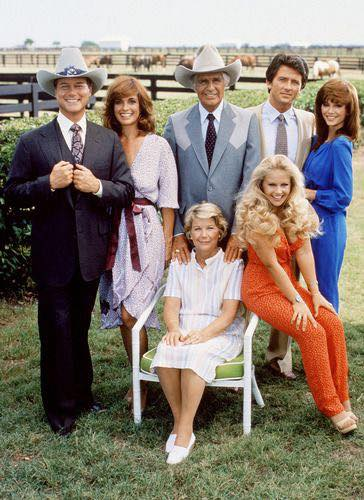Dallas, the iconic American prime-time soap opera, captivated audiences for over a decade with its tales of power, betrayal, and family drama. Airing on CBS from April 2, 1978, to May 3, 1991, the series wasn’t just a television show—it became a cultural juggernaut. Centered on the wealthy and conflict-ridden Ewing family of Texas, Dallas combined high-stakes business with personal turmoil, leaving an indelible mark on TV history.
The Bold Beginnings of Dallas

When Dallas premiered as a five-part miniseries, no one could have predicted its seismic impact. Originally slotted late on Sunday nights, the series focused on the rivalry between the Ewings, a powerful oil dynasty, and the Barneses, a family with a deep-seated grudge against them. At its heart was the forbidden romance between Bobby Ewing and Pamela Barnes, whose union symbolized hope amidst generations of feuding.
The show’s mix of wealth, intrigue, and romance struck a chord with viewers, prompting CBS to commission a full series. Over the course of 14 seasons, Dallas became the gold standard for prime-time drama.
The Ewing Dynasty: Wealth, Power, and Dysfunction
At the center of Dallas was the Ewing family, a portrait of privilege and strife. Led by patriarch Jock Ewing and matriarch Miss Ellie, the family’s interactions were rife with conflict, ambition, and occasional moments of tenderness.
- J.R. Ewing: Portrayed by Larry Hagman, J.R. was the show’s breakout character. As the scheming oil tycoon, J.R. manipulated friends, foes, and family alike to get his way, becoming one of television’s most iconic villains.
- Bobby Ewing: The moral compass of the family, Bobby was J.R.’s polar opposite. His love story with Pamela Barnes offered a counterpoint to the drama, symbolizing unity amidst chaos.
- Miss Ellie and Jock Ewing: Played by Barbara Bel Geddes and Jim Davis, these characters anchored the show, embodying tradition and resilience as they navigated the family’s constant crises.
The Ewings’ wealth and power created a compelling backdrop for their interpersonal struggles, making the audience feel like part of the family’s saga.
Cliffhangers That Changed Television
No show mastered the art of the cliffhanger like Dallas. The series left viewers eagerly awaiting resolutions, turning episodes into cultural events.
“Who Shot J.R.?”
The season three finale saw J.R. shot by an unknown assailant, sparking a global frenzy. The question “Who shot J.R.?” dominated conversations for months, with over 90 million viewers tuning in for the reveal, making it one of the most-watched episodes in TV history.
Bobby’s Death and Return
Season eight ended with Bobby’s tragic death, shocking fans. In true soap opera fashion, his return in season nine—revealed as part of Pam’s dream—became one of television’s most controversial yet unforgettable twists.
Other Shocking Endings
From fiery explosions to unexpected deaths, Dallas ensured that every finale was a must-watch event, cementing its reputation as the king of cliffhangers.
Themes of Power, Betrayal, and Family Feuds

At its core, Dallas explored universal themes that resonated with audiences. The Ewings’ oil empire represented ambition and greed, while their personal lives were a web of betrayal and heartbreak. The decades-long feud between the Ewings and the Barneses, rooted in Jock Ewing’s alleged betrayal of Digger Barnes, added a layer of generational tension that drove much of the drama.
This intricate tapestry of business rivalries and personal vendettas created a narrative both grand in scope and deeply personal, ensuring Dallas appealed to a wide audience.
A Global Phenomenon and Cultural Milestone
Dallas wasn’t just a hit in the United States; it became a worldwide sensation. Its blend of glamour, drama, and suspense captivated viewers in over 90 countries, making it one of the most successful exports in television history.
Television Innovation
The show proved that serialized storytelling could thrive in prime time, paving the way for future dramas like Dynasty, The Sopranos, and Breaking Bad.
Pop Culture Icon
The phrase “Who shot J.R.?” entered the cultural lexicon, symbolizing the show’s far-reaching influence. References to Dallas appeared in movies, music, and even political discourse.
Accolades
With four Emmy Awards, multiple Golden Globe nominations, and widespread critical acclaim, Dallas solidified its place in TV history.
Spin-Offs and Revivals

The success of Dallas gave rise to Knots Landing, a spin-off that debuted in 1979. Focusing on middle son Gary Ewing’s life away from Southfork Ranch, Knots Landing ran for 14 seasons, becoming a hit in its own right.
In 2012, TNT revived Dallas with a continuation series that introduced a new generation of Ewings while staying true to the original’s spirit. Though it lasted only three seasons, the revival rekindled interest in the franchise and brought the iconic family to a new audience.
The Lasting Appeal of Dallas
Decades after its finale, Dallas remains a touchstone of television excellence. Its mix of compelling characters, high-stakes drama, and groundbreaking storytelling set a standard that many shows continue to emulate.
The series finale in 1991 left fans with yet another tantalizing cliffhanger. While it marked the end of the original run, it also cemented Dallas as a show that kept viewers on the edge of their seats until the very last frame.
Conclusion: A Legacy That Shaped Television
From its sweeping Texas landscapes to the glittering boardrooms of Ewing Oil, Dallas captivated millions with its stories of ambition, betrayal, and family loyalty. Whether you were drawn in by J.R.’s cunning schemes, Bobby’s steadfast morals, or the never-ending feuds, Dallas offered something for everyone.
More than just a soap opera, Dallas was a reflection of power, greed, and the complexities of family relationships. Its influence on television storytelling is undeniable, and its legacy continues to inspire new generations of creators and fans alike. For those who experienced it, Dallas wasn’t just a show—it was an event, proving that great stories never truly end.


